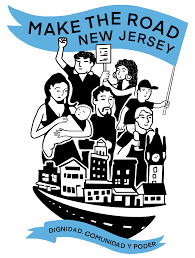Advocate, Expert Say NJ Immigrants Have Been Left Behind During Pandemic

NOTE: This story is part of the “After the Pandemic: Reporting on NJ Underserved Communities” fellowship administered by the Center for Cooperative Media at Montclair State University and financially supported by the Democracy Fund and Geraldine R. Dodge Foundation.
By Clyde Hughes | AC JosepH Media
Immigrants in New Jersey are being left behind and continue to face enormous challenges in the face of the coronavirus pandemic, an immigration advocate and expert said in a recent interview.
Nedia Morsy, the lead organizer at Make the Road New Jersey, and Muzaffar Chishti, director of the Migration Policy Institute at New York University’s School of Law, recently talked to journalists about the continuing crisis immigrants face despite the country slowly coming off of coronavirus restrictions and the domestic economy improving.
“To date, undocumented immigrants and their families have been left behind by nearly every form of government aid,” Morsy said, pointing out that immigrants have contributed $1.2 billion to the unemployment fund over the past decade.
“When the pandemic hit, they were eligible for zero dollars of that,” Morsy said. “That continues to be the case up until today.”
Make the Road said there are about 500,000 undocumented immigrants in New Jersey. More than half of them have children and/or a spouse who are U.S. citizens. They pay some $600 million in state and local taxes annually and $1 billion in federal taxes.
Yet, they are now not eligible for the benefits they have faithfully paid into over the years during the pandemic. The CARES Act and other pandemic-relief actions by the government explicitly excluded undocumented immigrants.
Chishti said the pandemic is also a healthcare crisis for many immigrants because they often have frontline jobs where they are exposed to the coronavirus, yet they are the most likely ones who will not have the type of healthcare needed in such a crisis.
He said six million immigrant workers are clustered into the three main frontline occupations — healthcare, food production and transportation.
“Meat packing plants became one of the first hot spots for the virus,” Chishti said. “Then we learned that immigrants disproportionately had a lack of access to healthcare because they didn’t have health insurance and were not eligible for public benefits.
“Today, 7.7 million foreign nationals do not have access to healthcare insurance. This has become a healthcare crisis for the immigrant population,” Chishti said.
Latinos, which make up the bulk of the membership in Make the Road New Jersey, have been caught in no-win situations. Morsy said they are often faced with the choice of missing work when they developed symptoms. Some jobs offer them little or no protection, such as sick pay or insurance.
“That makes for an incredibly dangerous workplace,” Morsy said.
She pointed out that Latinos are seven times more likely to die from COVID-19 in New Jersey and Latino men make up 43% of coronavirus deaths in the state but 12% of the population.
Morsy said in a recent Make the Road Survey of New Jersey, they found that six months after the pandemic started, 81% of the respondents said they lived in a household where one or more lost their jobs, 85% said they were unable to pay for food or medications, one in eight have been harassed by their landlord despite an eviction moratorium.
“Two out of three feel they are unsafe at work,” Morsy said. “They feel like they don’t have the ability to skip work if they do get sick.”
Morsy said because of the pressure put on by her organization and others, including a hunger strike, Gov. Phil Murphy designated $40 million in federal funds for undocumented immigrants called the New Jersey Excluded Person Fund. That fund offers one-time cash benefits of $2,000 per household.
“The fund is about 10% of all New Jersey, excluding undocumented workers,” Morsy said. “It’s still not enough. It’s just a drop in the hat of what’s actually needed here in the state.”
Morsy said her organization plans on continuing its campaign called Recovery4All and is hoping for more changes and relief in the upcoming legislative session.
Follow Us Today On:
Note from AC JosepH Media: If you like this story and others posted on Front Runner New Jersey.com, lend us a hand so we can keep producing articles like these for New Jersey and the world to see. Click on SUPPORT FRNJ and make a contribution that will do directly in making more stories like this available. Thank you for reading.




